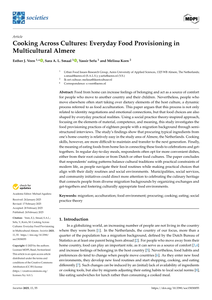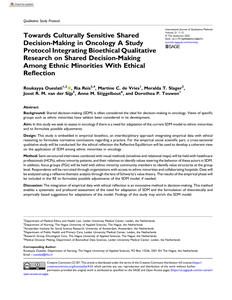Despite decades of residence, Turkish-Dutch citizens, one of the largest immigrant groups in the Netherlands, continue to face significant disparities in health, social, and economic factors compared to native Dutch citizens. To better understand this persistent disparity, we examined the acculturation process of Turkish-Dutch citizens across three generations. Our study addressed two critical research gaps: (1) acculturation processes across three generations within a specific immigrant group, and (2) different acculturation domains across these generations. Data from 464 participants (232 Turkish-Dutch, 232 Dutch) show that acculturation varies significantly across generations (1st, 2nd, and 3rd) and domains (i.e., national identification, cultural values, language, and media use), with the second generation demonstrating the strongest resemblance to native Dutch citizens in most domains. These findings contribute to a nuanced understanding of acculturation processes and confirm the need for future research to consider generational differences and domain-specificity. The results have potential implications for policymakers and practitioners aiming to reduce disparities of Turkish-Dutch citizens with tailored policy and communication strategies.
MULTIFILE

Food from home can increase feelings of belonging and act as a source of comfortfor people who move to another country and their children. Nevertheless, people whomove elsewhere often start taking over dietary elements of the host culture, a dynamicprocess referred to as food acculturation. This paper argues that this process is not only related to identity negotiations and emotional connections, but that food choices are also shaped by everyday practical realities. Using a social practice theory-inspired approach, focusing on the elements of material, competence, and meaning, this study investigates the food provisioning practices of eighteen people with a migration background through semistructured interviews.Keywords: migration; acculturation; food environment; procuring; cooking; eating; social practice theory
DOCUMENT

This paper will describe the rationale and findings from a multinational study of online uses and gratifications conducted in the United States, Korea, and the Netherlands in spring 2003. A survey research method of study was conducted using a questionnaire developed in three languages and was presented to approximately 400 respondents in each country via the Web. Web uses and gratifications were analyzed cross-nationally in a comparative fashion and focused on the perceived involvement in different types of on-line communities. Findings indicate that demographic characteristics, cultural values, and Internet connection type emerged as critical factors that explain why the same technology is adopted differently. The analyses identified seven major gratifications sought by users in each country: social support, surveillance & advice, learning, entertainment, escape, fame & aesthetic, and respect. Although the Internet is a global medium, in general, web use is more local and regional. Evidence of media use and cultural values reported by country and online community supports the hypothesis of a technological convergence between societies, not a cultural convergence.
DOCUMENT
The professional growth of midwives, essential for optimizing midwifery leadership globally, can be enhanced through twinning collaborations. How twinning promotes growth is unclear. This case study explores how professional growth is affected by cultural differences between twins. We used a longitudinal qualitative design including data from open-ended questionnaires and focus groups. These data were analyzed using a content analysis. Our findings show that cultural differences were capable of both hindering and facilitating professional growth. Within the complex dynamics of twinning, professional growth was facilitated by twins’ preparedness to bridge cultural differences. Common goals positively influenced this process. Friction was more likely, and professional growth was hindered, when midwives were unprepared to bridge cultural differences. To optimize professional growth through twinning, we recommend a clear focus on common goals and consideration of the interaction between the length of a project and the extent of the cultural differences between twins.
DOCUMENT

This study focuses on SME networks of design and high-tech companies in Southeast Netherland. By highlighting the personal networks of members across design and high-tech industries, the study attempts to identify the main brokers in this dynamic environment. In addition, we investigate whether specific characteristics are associated with these brokers. The main contribution of the paper lies in the fact that, in contrast to most other work, it is quantitative and that it focuses on brokers identified in an actual network (based on both suppliers and users of the knowledge infrastructure). Studying the phenomenon of brokerage provides us with clear insights into the concept of brokerage regarding SME networks in different fields. In particular we highlight how third parties contribute to the transfer and development of knowledge. Empirical results show, among others that the most influential brokers are found in the nonprofit and science sector and have a long track record in their branch.
DOCUMENT

Background: Shared decision-making (SDM) is often considered the ideal for decision-making in oncology. Views of specific groups such as ethnic minorities have seldom been considered in its development. Aim: In this study we seek to assess in oncology if there is a need for adaptation of the current SDM model to ethnic minorities and to formulate possible adjustments. Design: This study is embedded in empirical bioethics, an interdisciplinary approach integrating empirical data with ethical reasoning to formulate normative conclusions regarding a practice. For the empirical social scientific part, a cross-sectional qualitative study will be conducted; for the ethical reflection the Reflective Equilibrium will be used to develop a coherent view on the application of SDM among ethnic minorities in oncology. Method: Semi-structured interviews combined with visual methods (timelines and relational maps) will be held with healthcare professionals (HCPs), ethnic minority patients, and their relatives to identify values steering the behavior of these actors in SDM. In addition, focus groups (FGs) will be held with ethnic minority community members to identify value structures at the group level. Respondents will be recruited through organizations with access to ethnic minorities and collaborating hospitals. Data will be analyzed using a reflexive thematic analysis through the lens of Schwartz’s value theory. The results of the empirical phase will be included in the RE to formulate possible adjustments of the SDM model, if needed. Discussion: The integration of empirical data with ethical reflection is an innovative method in decision-making. This method enables a systematic and profound assessment of the need for adaptation of SDM and the formulation of theoretically and empirically based suggestions for adaptations of the model. Findings of this study may enrich the SDM model.
DOCUMENT

With an increasingly ageing population there will be a rising demand for palliative care, including from older migrants and ethnic minorities. While many (future) physicians are unfamiliar with specific needs of older migrants and ethnic minorities regarding care and communication in palliative care, this may be challenging for them to deal with. Moreover, even many medical teachers also feel unprepared to teach palliative care and culturally sensitive communication to students. In order to support medical teachers, we suggest twelve tips to teach culturally sensitive palliative care to guide the development and implementation of teaching this topic to medical students. Drawn from literature and our own experiences as teachers, these twelve tips provide practical guidance to both teachers and curriculum designers when designing and implementing education about culturally sensitive palliative care.
MULTIFILE

Standard SARS-CoV-2 testing protocols using nasopharyngeal/throat (NP/T) swabs are invasive and require trained medical staff for reliable sampling. In addition, it has been shown that PCR is more sensitive as compared to antigen-based tests. Here we describe the analytical and clinical evaluation of our in-house RNA extraction-free saliva-based molecular assay for the detection of SARS-CoV-2. Analytical sensitivity of the test was equal to the sensitivity obtained in other Dutch diagnostic laboratories that process NP/T swabs. In this study, 955 individuals participated and provided NP/T swabs for routine molecular analysis (with RNA extraction) and saliva for comparison. Our RT-qPCR resulted in a sensitivity of 82,86% and a specificity of 98,94% compared to the gold standard. A false-negative ratio of 1,9% was found. The SARS-CoV-2 detection workflow described here enables easy, economical, and reliable saliva processing, useful for repeated testing of individuals.
LINK
This study empirically examines individual and organizational factors that influence expatriates’ cross-cultural adjustment and job performance. The study was a quantitative research from 117 Thai expatriates who work in Thai multinational companies (MNC) located in Indonesia. The results of the study indicated that financial perceived organizational support influence positively towards Thai expatriates’ overall cross-cultural adjustment in Indonesia. This study found that cross-cultural training influenced positively towards Thai expatriates’ adjustment. A causal relationship between the predicting variables of crosscultural adjustment and Thai expatriates’ job performance was not found. Results suggest important consequences for management strategies providing support to Thai expatriate employees increasing their adjustment in Indonesia. Keywords: Cross-Cultural Adjustment; Job
DOCUMENT

Muscle fiber-type specific expression of UCP3-protein is reported here for the firts time, using immunofluorescence microscopy
DOCUMENT
